Ryzen 9 9950X3D Test Configuration
Here is the basic test configuration we used:
- System: Gigabyte X870E Aorus Master
- CPU: AMD Ryzen 9 9950X3D
- Memory: 2x G.SKILL 32GB DDR5-6000 UDIMMs
- OS SSD: Samsung 980 PRO 1TB
- OS Environments: Windows 11 24H2, Ubuntu 24.04.2
- Cooling: Thermalright Frozen Prism 360mm AIO
Additionally, I had a separate 64GB (2x 32GB OLOy DDR5-6000) memory kit that is slightly slower latency than the G.SKILL kit. This was used specifically for AI testing where the larger capacity allowed for a bigger model to be loaded. And as a final note, when Ubuntu was being tested a USB gigabit ethernet adapter was used since the onboard 5 Gbit NIC was not supported out of the box on Ubuntu and I connected the USB adapter for simplicity.
AMD Ryzen 9 9950X3D Benchmarks
As some might notice, this is my first CPU review on STH, but I still wanted to give some sense of the performance of the parts. We have a ton of Intel chips at STH, but those tend to be 35W-65W TDP variants. As a result, it felt a bit strange to compare either 2-3 generation old Intel parts to the new AMD parts, or to pit a 65W TDP part against a 170W TDP part. Instead, we are just going to show the AMD-to-AMD generational comparison here to avoid that.
Linux Kernel Compile Benchmark
First up we have a fairly standard Linux kernel compilation benchmark.

I saw a fairly linear progression of improvement with each subsequent generation of AMD Ryzen 16-core CPUs. Of note here is that while the 7950X3D loses to its non-X3D counterpart in this test, the Ryzen 9 9950X3D manages to outpace its brother by a decent margin. The lower TDP for the 7950X3D was likely holding it back in this scenario.
7-Zip Compression Benchmark
On the compression side, we wanted to see how the new chip would fare compared to some other options.

In 7-zip, the 9950X and 9950X3D top the chart, with the X3D variant enjoying a tangible advantage over its lower-cache brother. While the 7950X3D had a small advantage over the 7950X, the 9950X3D’s lead is more significant, indicating this test benefitted both from the higher clocks and TDP of the 9950X3D along with its extra cache.
Something quite notable here is that the performance is a bit under twice that of the AMD Ryzen 9 3950X, launched in 2019. One way to look at it is that chips have only gotten twice as fast in 5.5 years. Another way to look at it is we are getting close to twice the performance per core at this point.
OpenSSL Benchmarks
We are going to put the OpenSSL numbers up with many of the lower-end systems we test just to give some sense of scale.
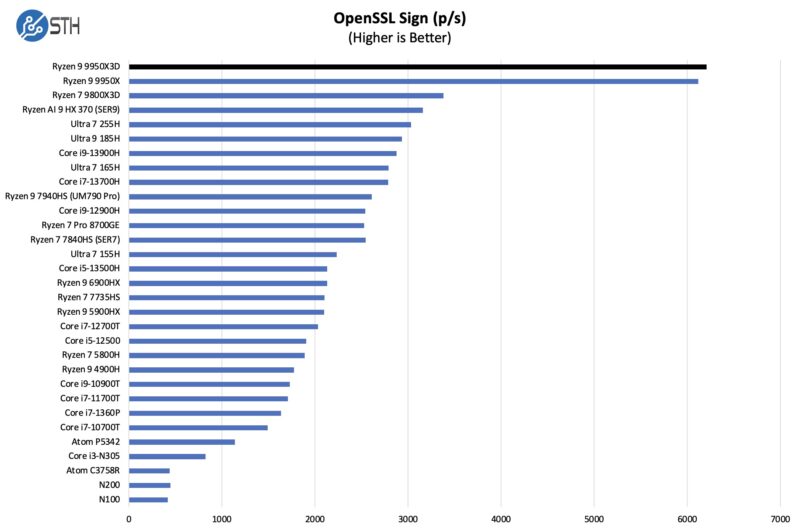
Here are the verify results:
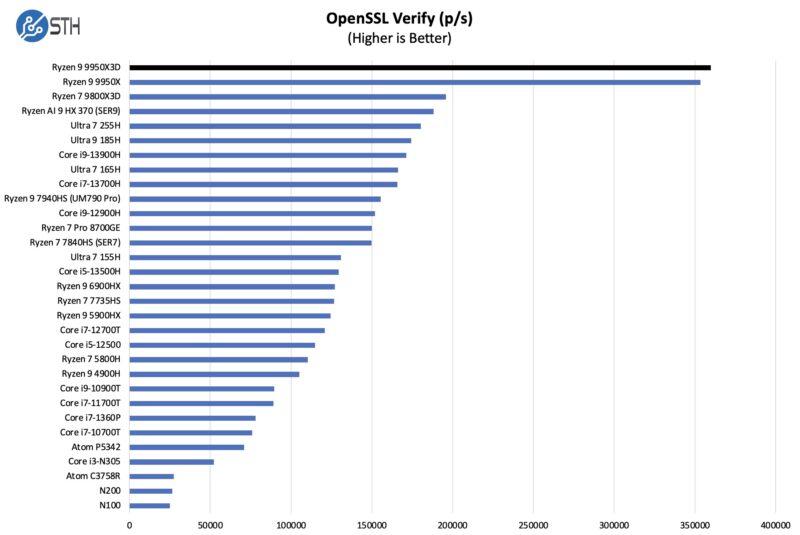
This is why we are keeping these CPUs away from the huge dataset that we have for the lower power processors. There is still an enormous gap opened by the higher-power parts. That thermal headroom and 16 Zen 5 cores really helps a lot.
Cinebench 2024
Cinebench drag racing has long been a pastime for putting a new CPU through its paces, and the 9950X3D does not disappoint.

While the 7950X3D suffered compared to its 7950X brother, the 9950X3D ekes out a small lead compared to its non-X3D partner. Once again, the higher TDP for the 9950X3D manages to serve it well.
ollama-benchmark LLM AI Performance
We ran the ollama-benchmark just to get some sense of AI performance.
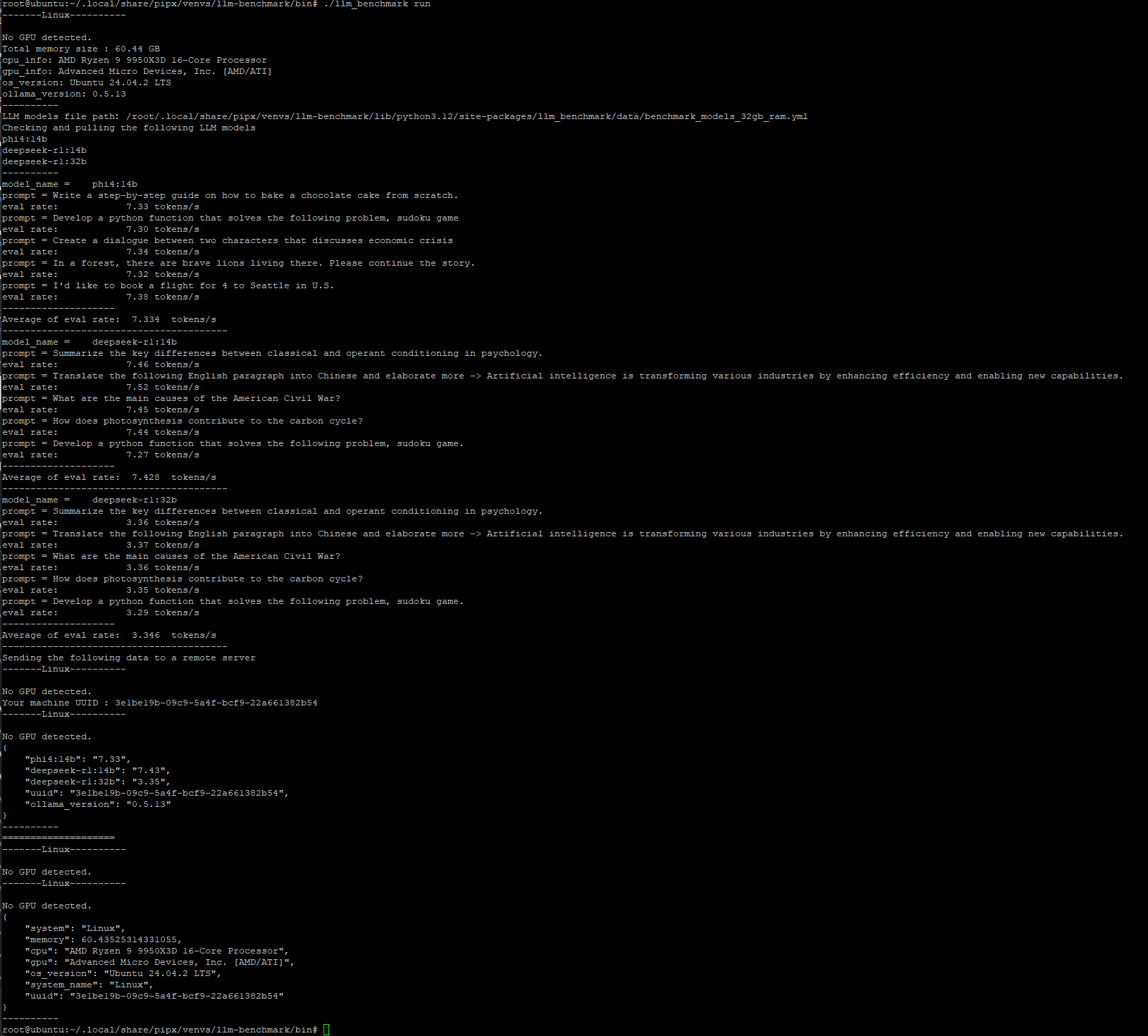
I went ahead and tried out on-CPU AI performance, mostly just for the fun of it. Armed with 64GB of RAM, I was able to test deepseek-r1:32b at an average token rate of 3.346 tokens/s. This kind of performance will not win in a drag race compared to anything you might run on a GPU, but if you don’t have 24GB of VRAM on your GPU then the CPU might be your only option.
Geekbench 5 and 6 Results
Just so you can easily compare this to your own system, we have a number of Geekbench 5 and 6 results.
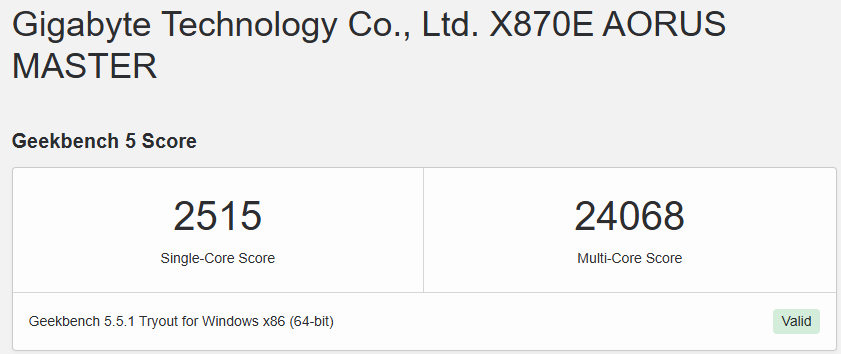
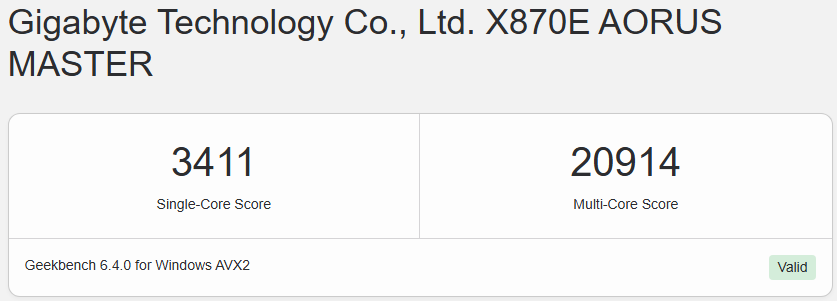
I don’t personally have many other Geekbench results to compare these against, but it certainly mops the floor with my 5950X, which scored 1667/16654 on Geekbench 5, and 2248/13629 on Geekbench 6.
Next, let us get to the clock balance between CCDs.



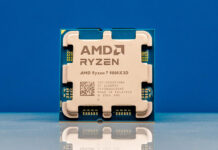
‘With all of this said, if AMD gave us the option to have 3D V-Cache on both CCDs so that we could avoid having one set of lower cache and one set of higher cache cores, I think a lot of folks would be interested.’
I’d be interested in a theoretical dual v-cache 9950x3d up to about the $1000 mark. AMD could easily position such a product in a new halo tier at such a price.
> “And as a final note, when Ubuntu was being tested a USB gigabit ethernet adapter was used since the onboard 5 Gbit NIC was not supported out of the box on Ubuntu and I connected the USB adapter for simplicity.”.
You need kernel 6.13 for the Realtek 8126 support built-in, which Ubuntu 24.04.2 lacks.
See also: https://github.com/awesometic/realtek-r8126-dkms?tab=readme-ov-file
Rob,
Thanks! I saw that, just wasn’t worth it since I wasn’t doing any NIC throughput testing. I don’t have a 5 Gbit switch anyways :)
“You need kernel 6.13 for the Realtek 8126 support built-in, which Ubuntu 24.04.2 lacks.”
“See also: https://github.com/awesometic/realtek-r8126-dkms?tab=readme-ov-file”
Which means FreeBSD will have support in about 3-5 years. :)